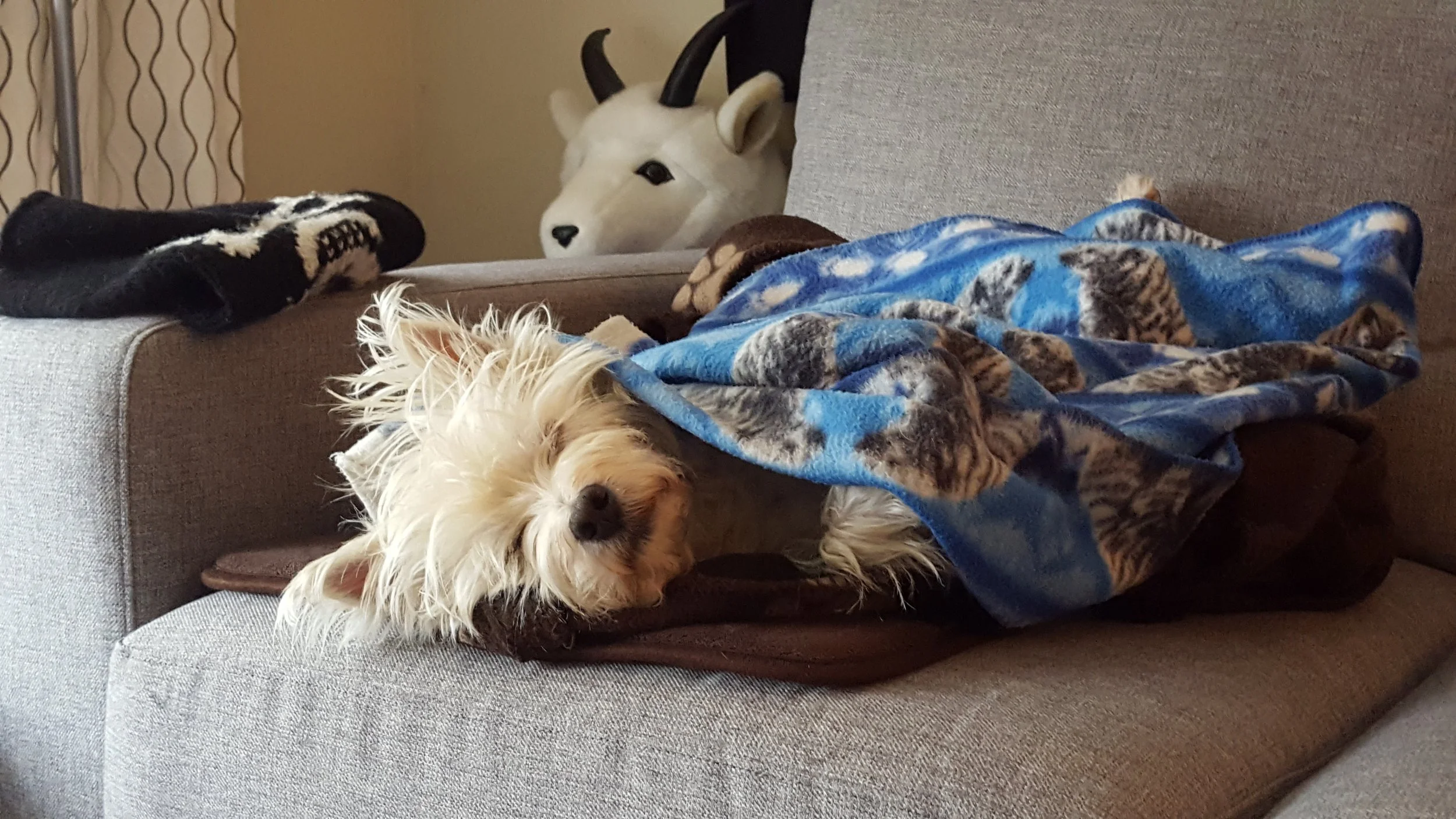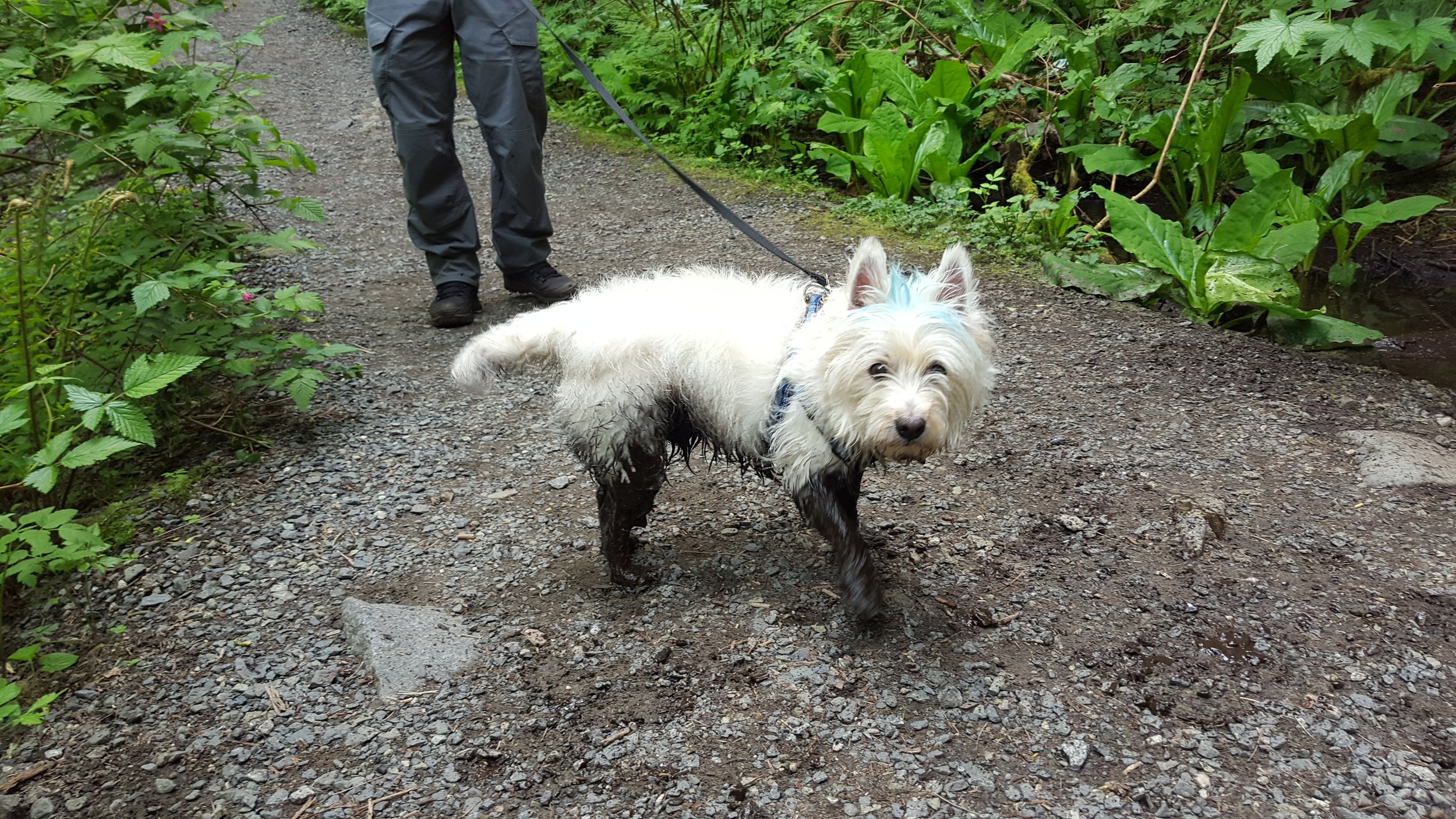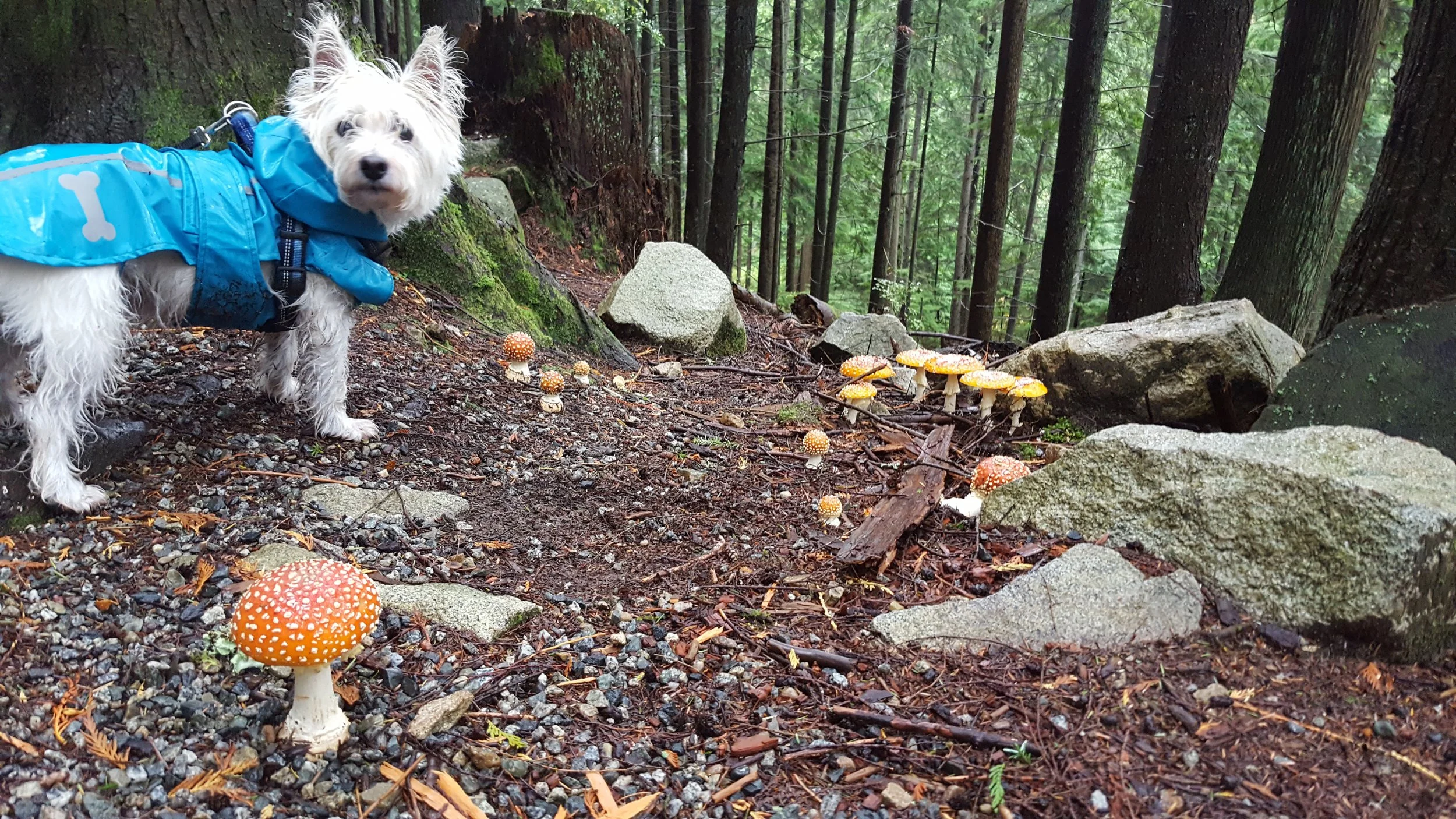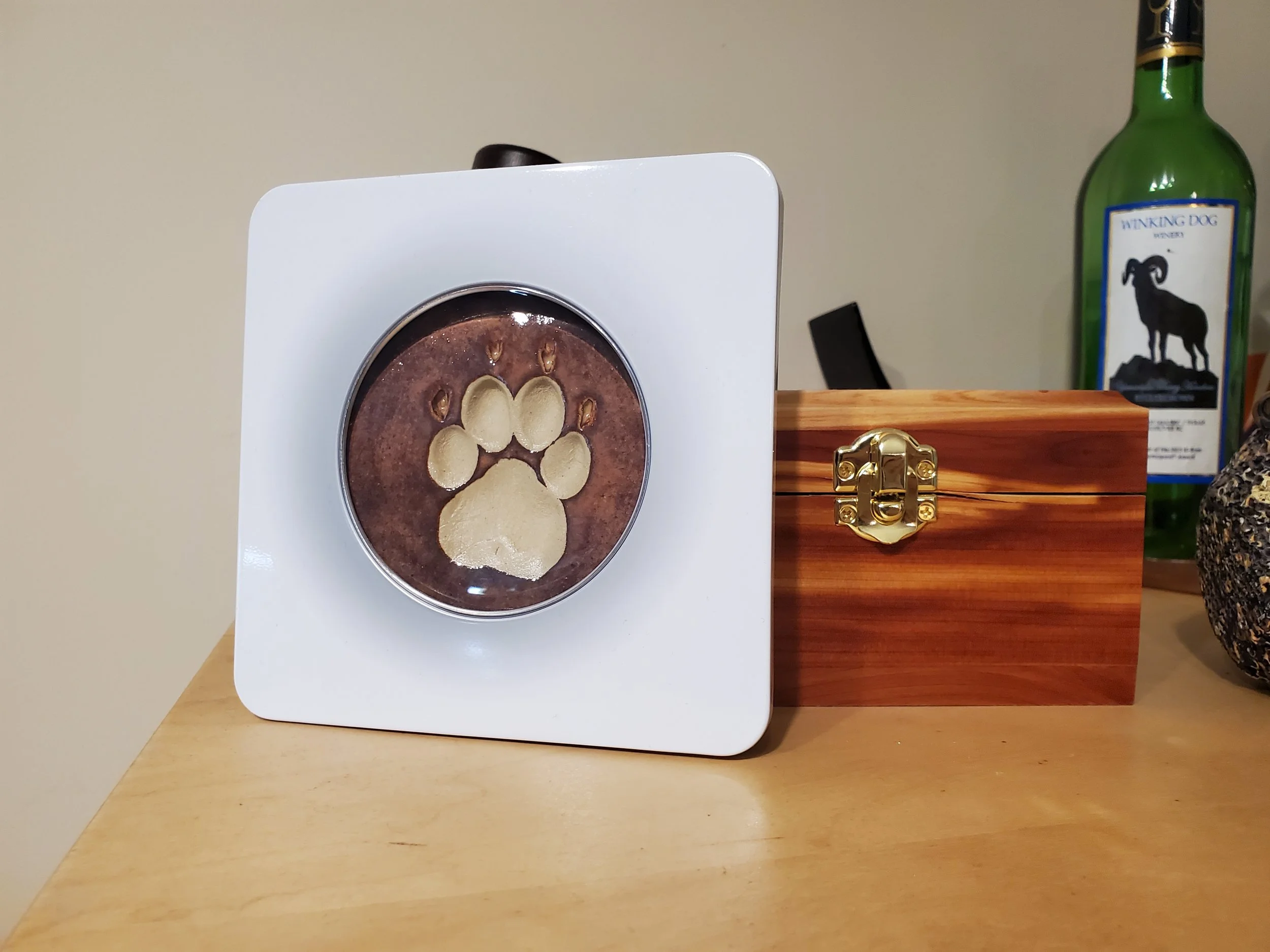10 life lessons I learned from my dog, Shadow
Lesson #10 - Rest (or have naps) when needed. Bonus tip: Stretch often
I don’t think we rest enough. This world keeps telling us to do more and achieve more. For sure, I’m a huge fan of striving for excellence, personal growth (you should see my self help library), running a little farther, lifting a little heavier. At the same time, I believe in balancing that ambition with listening to your body and mind. Not every moment of your life is meant to reach, hustle or achieve.
We are inundated with capitalistic-style messages that we’re not enough unless we have achieved or acquired “the thing,” (often an arbitrary goal) which often comes at the sacrifice of rest and self care.
In fitness, one key factor to seeing results is recovery. If you’re lifting weights and either I, or your personal trainer have told you to work out three times a week, you’ll notice we’ll space out the weights sessions (for example: Monday, Wednesday and Friday) instead of, “let’s get it over with and do three days in a row, then you can smash in 3 runs and 2 yoga classes by Sunday!”
Where are the rest days? (I know some of you really hate this idea, haha). Batman never seems to take recovery days or sleep, he’s definitely not human.
So rest. I promise your brain and body will thank you.
Lesson #9 - It’s fun to roll up your sleeves and get a little dirty sometimes
Get Dirty.
Growing up, I rarely was chided for coming home covered head to toe in mud, which was kind of amazing because my parent’s house was PRISTINE. They didn’t expect me to act “like a lady” (unless it was at an important family dinner, where they slapped me in a dress and I hated every second of that, but that’s a different blog). They allowed me to wade through ditches, run around in fields catching grasshoppers - climb trees, scratched knees, you know how it goes.
Shadow, armpit deep in mud - “I will take one chocolate dipped, vanilla westie, please”
The kind of dirt most kids got into, mostly soil, which has the bacteria Mycobacterium vaccae that happens to be absorbed through skin (gardeners, this is you too). Apparently this triggers a release of serotonin which acts as a natural antidepressant and mood booster. While these studies were done on mice, it’s a solid first step towards researching dirt and happiness).
Other research also has demonstrated that people exposed to dirt and microbes have lower incidence of allergies, asthma or other auto-immune disorders like Crohn’s Disease.
As adults, we might benefit from a little wild dirt from time to time, so here’s a shameless plug to join me in a forest therapy session, or find a guide closer to you, to get in some (safe) dirt time.
Fun fact: soil bacteria are a source of antibiotics and medicines. Penicillin was literally discovered by accident from mould—a MOULD. Nature is wild.
Lesson #8 - Love the people in your life. Greet them like they matter, tell them how you feel
There’s this joke about dogs: you can leave your home for a whopping 10 seconds, and when you come back through that door, they greet you like they haven’t seen you in 10 years.
But honestly, it’s kinda great having someone think you’re the bees knees that’s constantly happy to see you, even if you’re carrying 7 bags of groceries, a coffee cup and your work stuffs and their joy is about to knock you over.
I’ve walked into rooms where people greeted me like I mattered (standing ovation not necessary), and I’ve also walked into rooms and felt ignored. It’s one thing when I’m slipping into a meeting late and WANT to go unnoticed, but it’s another when you’re hoping for a friendly smile or nod of recognition. Maybe you’re one of the cool kid popular types that has never experienced this (woo hoo) but for the rest of us, greeting people like they matter, matters.
It’s a bit of a morbid thought, but I often think “one day they won’t be there” and how heartbreaking is that? If you’ve ever lost someone, you know this thought. This is what drives me to follow Shadow’s lead and love the heck out of people in my life and acknowledge them like they matter, because they do.
Also, this might be a good time to call your mom. Or dad.
Lesson #7 - Celebrate the small things in life
This one took me a while - as a kid, I had these ridiculously high standards for myself. I was pushed to aim high and had a big brother who’s successes I felt I had to match. He was 8 years older than me, so those standards were a little warped. Of course I’m not going to know the Pythagorean theorem in grade 6 but hooo boy, did I have to learn it when my family found out I didn’t know it.
Whatever I did, it never felt good enough. So I stopped celebrating anything. Why bother?
I thought aiming high would help me achieve great things. Instead, I achieved low self-esteem, chronic self-doubt, and a warped view of success. Got a degree? Meh. Run a profitable small business for 20 years? Probably failed at that. Won some awards? Booo-urns.
Who do we know, that kinda has that attitude? It’s amazing, right? To see people that have actually achieved something but completely write it off seems absurd. Aiming high is great, as I said before, but it needs balance through celebration of achievements, even the little things…ESPECIALLY the little things.
What counts as a “small win” varies from person to person and season to season. On a motivated Monday, it might be calling 10 accountants and 10 lawyers to build your business. On a rough Thursday? Folding 2 towels and a T-shirt…or simply showering.
While it might seem trivial, celebrating small wins builds self-esteem, helps with goal-setting, and boosts confidence. It’s not about bragging or show-boating (post that shower selfie if you want, no shade), it’s about recognizing effort. Many of us do hard things and then immediately diminish ourselves for it. We never win that way.
Here’s another weird thing - with kids or our pets, they’ll achieve something like pick up a stick and we’ll praise the heck out of them. WHY? Because it encourages them, helps their brains develop and we also feel a flood of feel-good chemicals to do it. It it possible that we can do the same for ourselves and have a really, really positive outcome?
Shadow always looked so proud of himself when he found a stick. It was the best thing, ever.
Lesson #6 - Never pass up an opportunity for adventure
Remember those “Choose Your Own Adventure” books from the ‘80s? They allowed readers to be the main character and see where their sense of adventure might take them.
“A woodland creature suddenly appears and invites you down an unknown path. Do you:
Follow - go to page 43
Say no and take the other path - go to page 19
Stay put and ignore the creature - go to page 37“
Hopefully you’re not encountering strange woodland creatures these days, but what about small doses of adventure? Don’t like the idea of “adventure”? That’s okay, not everyone wants to go skydiving or take a hitchhiking trip across Asia. Substitute the word “novelty” if that feels better.
The concept of novelty has many purported benefits, and my favourite one is the idea that when you introduce yourself to new experiences, our brains encode more memories, making time seem fuller.
Easy ways to introduce novelty would be things like taking a different route home from work, trying a pop up farmers market or visiting a new coffee shop.
Adventure (or novelty) awaits!
Lesson #5 - Patience and perseverance are good things
Apparently the phrase “patience is a virtue” is attributable to poet William Langland, but I always hear Evelyn from The Mummy nervously sing it to her brother Jonathan while looking for a specific phrase in a tablet of…I digress.
Shadow was the master of waiting. He never begged or whined or tried to hurry things along, he would just be patient (with the exception getting to doggy daycare). He’d sit at the base of a tree, wait that squirrel out every day. Spoiler: he never caught it, but he sure tried. Every. Damn. Day.
He would persist at digging up the entire garden, convinced gold and treasure was buried down there, or maybe he was trying to dig up the foundation of the townhouse, we’ll never know.
I love these concepts of patience and persistence. They help me slow down in a world that promises everything now. Want it this afternoon? Buy it on Amazon Prime!
Need a dopamine hit? Post something for likes on social media!
Don’t want to put the effort in for abs? Take these pills!
Don’t want to write the blog? Ask AI to do it!
The problem with instant gratification or instant anything is it chips away at our ability to delay pleasure and think long term, which is detrimental to our minds and bodies. It can lead to impulsive decision making, which deteriorates our capacity to consider long term consequences for immediate pleasures. Negative outcomes can include financial burdens or debt, declining physical and mental health, and very often environmental destruction.
While this doesn’t mean we can’t enjoy some of the conveniences of the modern world, I believe it helps to be more conscious about the context, frequency, and consequences of being impulsive and practice a little more patience. Slowing down and practicing patience isn’t always glamorous, but it’s definitely worth it.
Lesson #4 - Ask for what you want
Shadow didn’t speak English, but he definitely had a way of communicating exactly what he wanted. THAT COOKIE. IN YOUR HAND. NOW. He never beat around the bush doing backflips or suggesting that he was “maybe perhaps kinda hungry, are you hungry?” he just marched up to you, made direct, constant eye contact and boom, somehow he got a bit of that cookie.
I once asked a friend how she always got so many birthday gifts (I like to keep mine a secret). She said, “I tell them it’s coming, and casually, I mention what I want. I never expect them to get me anything, but if they feel inspired to, they know what to do.” TBH I thought this was bold and way outside of my comfort zone, but it did plant a little seed in me.
The idea of being clear and not playing weird little mind games? I LOVE IT.
“Clarity is kindness” as they say, and when someone gives me a direct ask, it has been SO MUCH EASIER to help them. In business, if someone says I’m looking for XYZ client, I can keep an eye out for that kind of person. I’ve had people correct how I pronounce their name or ask me not to use a nickname. I always appreciate the immediate feedback.
Ask for what you want, you might just get that cookie.
Lesson #3 - Time for reflection and evaluation is important
Socrates said, "The unexamined life is not worth living” - okay that might be a bit dramatic, but I think the concept of reflection and evaluation makes life that much more…tasty.
Imagine you work on a project designed to help hundreds of people. You launch it, get a “great job!” from the boss (even if that’s you), and move on to the next task. No check-in or lessons learned. No curiosity about what worked or what could be improved for version 2.0.
That’s what life is like without reflection. We just keep going on to the next interaction, next project, next season, all without collecting the insights that help you grow. Reflection and evaluation help us evolve. They turn version 1.0 of ourselves into 1.5 or 2.0…with fewer bugs.
Take time for yourself to reflect and evaluate. Your future self will thank you!
Lesson #2 - Play and activity are often good solutions to problems
If you know me, you know I love to laugh, especially when clients roll their eyes at me because I call exercises “games,” and once in a while start spontaneous group karaoke moments in the gym.
Play is so incredibly important in the developing minds and bodies of youngsters (even baby animals need it). “Sure,” you think, “but I’m not a baby animal, I grew up and play is for children. I don’t have time for that immature nonsense. I’m an important adult with Very Important Adult Things to do.”
You got me there, you probably ARE an important adult that has important things to do! But play isn’t immature—it’s essential. Play can add joy to your life. This joy, the mental and physical break, can help relieve stress, boost creativity and supercharge productivity. Your brain can’t focus intensely on solution finding 24 hours a day. Brain breaks that lighten the mood, allow a perspective change and a little dopamine hit can let in that elegant solution that you’ve been really, really needing.
Often, when we engage in play with another person, it helps bring us closer together, establishing deeper bonds and can help with conflict resolution. Play can be tiny—a quick round of trivia, tic-tac-toe—or longer, like a game of foosball or learning a ridiculous TikTok dance to just embarrass your kids. (Highly recommended.)
Play. It’s not just for puppies and children. It’s for you.
Lesson #1 - Sometimes plans go unexpectedly sideways. And if they do, just try again.
Ah Shadow, my soul dog.
He came to me as a scrappy wee pup, my dad said he looked like a drowned rat (his fur was a little …rough). But he was my steady companion and forest sidekick, I had visions of us growing old together, me at 80 and him, faithfully by my side slowly toddling down the road together (I never said I was realistic).
I knew that dreaded day would come, but I didn’t know it would be so soon. He left me and shattered my heart into a billion pieces. It was a solid two weeks of random crying in public, exhausted days and nights before I could even consider normal functioning.
Thankfully no one ever said to me “it’s just a dog,” (probably because they knew I had done martial arts and lifted weights), but either way, I’m still grateful for that. I plodded forward one blurry moment at a time, wondering if I would ever be happy again. Anyone who’s lost someone they loved knows this kind of sadness. It’s a deep, strange grief.
Despite his departure from this realm, Shadow didn’t leave me hanging. He sent me his little brother in the form of Wolfgang to help heal his mother’s broken heart.
Paths end, sh*t happens, mistakes are made and doors close. All of these things can be extremely hard and an inevitable aspect of life. But even when it all goes sideways, there’s always love.
And there’s always the chance to try again.










